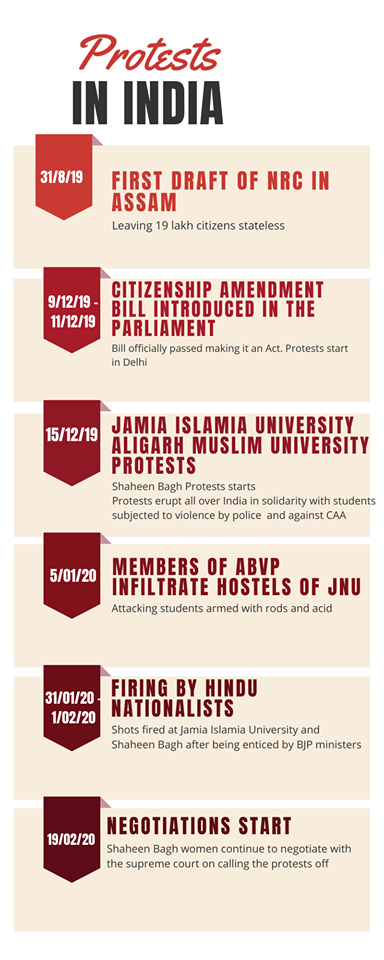By Saumya Jain

The Citizenship Amendment Bill (CAB) was introduced by the Central Government in the Parliament of India by the Home Minister Amit Shah on the 9 December, 2019. This bill was aimed at amending the Citizenship Act of 1955 to grant easier access for Indian citizenship. This applies to people escaping religious persecution who entered India on or before December 31, 2014.
Those who identify as Hindus, Sikhs, Buddhists, Jains, Parsis and Christians escaping such persecution from Afghanistan, Bangladesh and Pakistan are among those affected by this law. The CAB was passed within two days making this an official act that every state had to abide by.
The Citizenship Amendment Act (CAA) also aims to relax the requirement of residence in India for citizenship by naturalization, from 11 years to 5 years for migrants covered under it. This act also does not give any specifications about the religious Muslim minorities from these countries or the Rohingya, Sri Lankan Tamil and the Nepali refugees who have been in India fleeing religious persecution.
The CAA is to be implemented alongside the National Register of Citizens (NRC). This states that citizens need to show a specific set of documentation before they are entered on to this register. The register also aims to help the individuals who are coming in through to the CAA to gain citizenship, easier.
The implementation of this register has been carried out in the north-east state of India, Assam. The final draft of the NRC was released on the 31st of August 2019, leaving out almost 19 lakh citizens. This caused the first wave of protests against the two proposals to erupt. Despite the errors in the first round of drafting the registry in Assam, the Home Minister emphasised the necessity for a nationwide implementation of the registry.
The National Register of Citizens, when coupled with the Citizenship Amendment Act, will be one of the first steps toward making India an only Hindu state. This is something the right-wing Bhartiya Janta Party (BJP) have stated multiple times as being a part of their political agenda.
Following this, on 15 December, 2019, protests broke out against these Acts at the Jamia Islamia University of Delhi and Aligarh Muslim University. These protests deemed the acts unconstitutional; they were directly opposed to Article 14 of the Indian Penal Code. This states that “The State shall not deny to any person equality before the law or the equal protection of the laws within the territory of India.”
Use of brute force has not slowed down the citizens of India who continue to protest
The students were met with brute force from the paramilitary forces who have now been recorded on video. They are seen entering the university library using batons to hit students who were not even a part of these protests. This pushed the overnight momentum to get citizens out on the streets and demonstrate their disagreement with the government.
A huge amount of people will be rendered stateless overnight if these Acts are implemented nationwide. Not only are these discriminatory towards Muslims living in India but also to every marginalised community who do not have access to the specific set of documents. Lack of such documentation is due to several reasons, including natural disasters.
Following the violence in Jamia Islamia University, the citizens of Delhi came out in the cold of night and called an indefinite sit-in at Shaheen Bagh. They blocked a major highway in Delhi, with the protests being led by Muslim women making sure there is no way the ruling government can ignore them, again.
Shaheen Bagh has moved beyond just condemning police brutality concerning Jamia Islamia. It has become a sign of resistance against the ruling government, which is failing to provide for its citizens. First and foremost, the rising costs of commodities, increasing unemployment and poverty, and the disregard for the safety of women living in the country.
Several campaigning ministers during elections in Delhi have used hate speech in enticing their camps to oppose Shaheen Bagh. Namely, the chant “Desh ke gaddaro ko, goli maaro…”. This means, “shoot the people who are protesting against the country.” Such hatred is shown to have an effect when a Hindu nationalist open fired at Shaheen Bagh, while the police took no steps to prevent him from doing so.
He was confronted by a Kashmiri student trying to mediate and control the situation. This incident itself took place on the death-day of Mahatma Gandhi, who was assassinated by Hindu nationalist, Nathuram Godse. Godse had ties with the Rashtriya Swayamsevak Sangh (RSS), an organisation believing in Hindu supremacy that is also linked with the ruling BJP.
This isn’t the first-time insurgents have faced violence under the guise of nationalism. On 5 January, 2020, more than 50 masked people armed with rods, sticks and acid attacked the campus of Jawaharlal Nehru University, Delhi. This injured more than 39 students and teachers.
Eyewitnesses and students have linked these people to the Akhil Bharatiya Vidyarthi Parishad (ABVP) the youth wing of the BJP. They stated they are behind the organisation of these attacks on the university. Various state governments have come out against these Acts and stated they will not be implementing CAA or NRC.
The crackdown through use of brute force has not slowed down the citizens of India who continue to protest with the odds stacked against their favour. Despite the ongoing protests, the ruling government still plans to implement a nationwide NRC and further implement the CAA no matter how discriminatory the act may be.
Image credit: Xiamen

